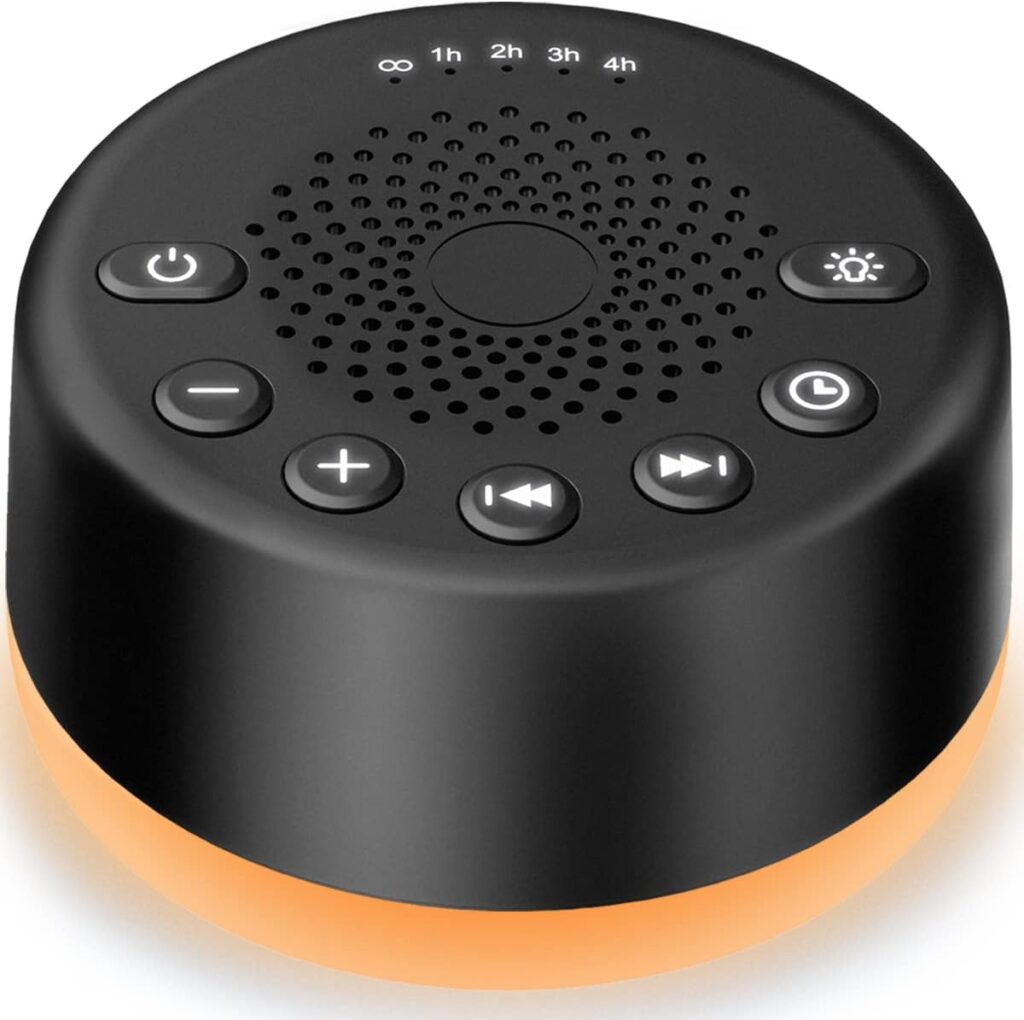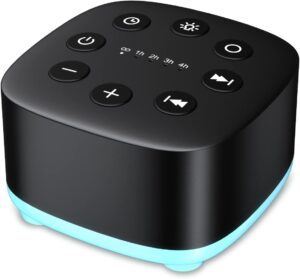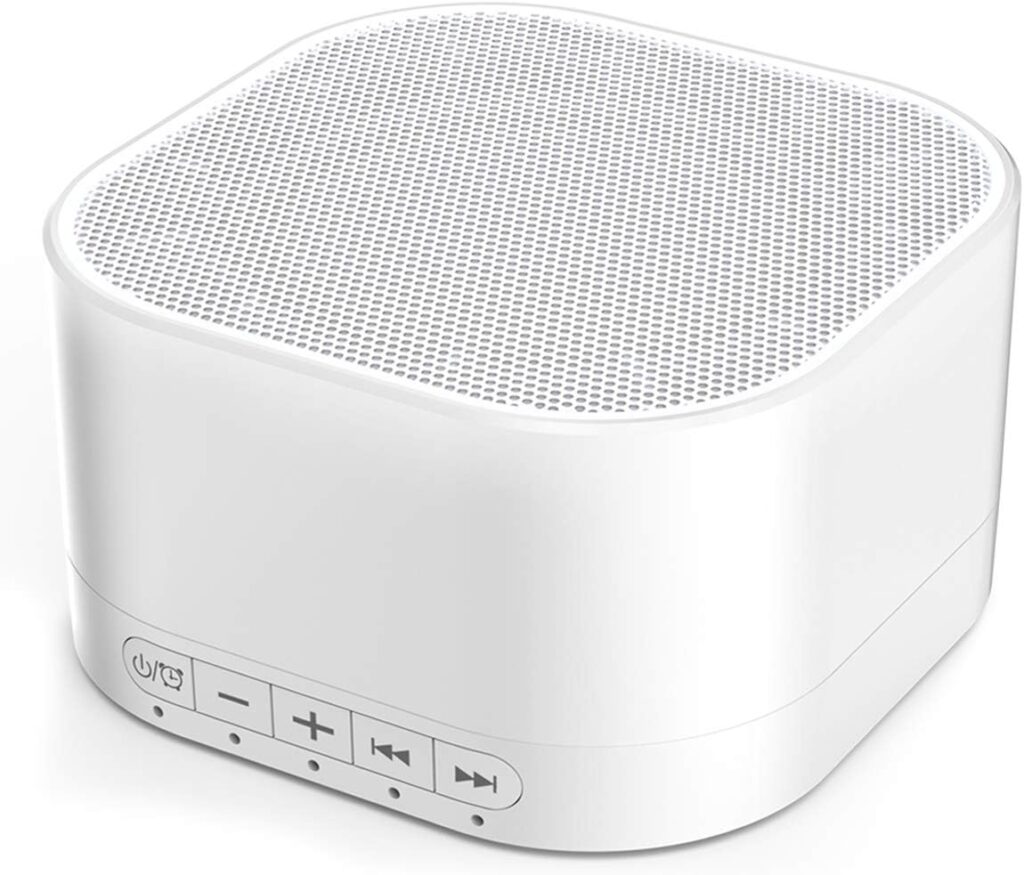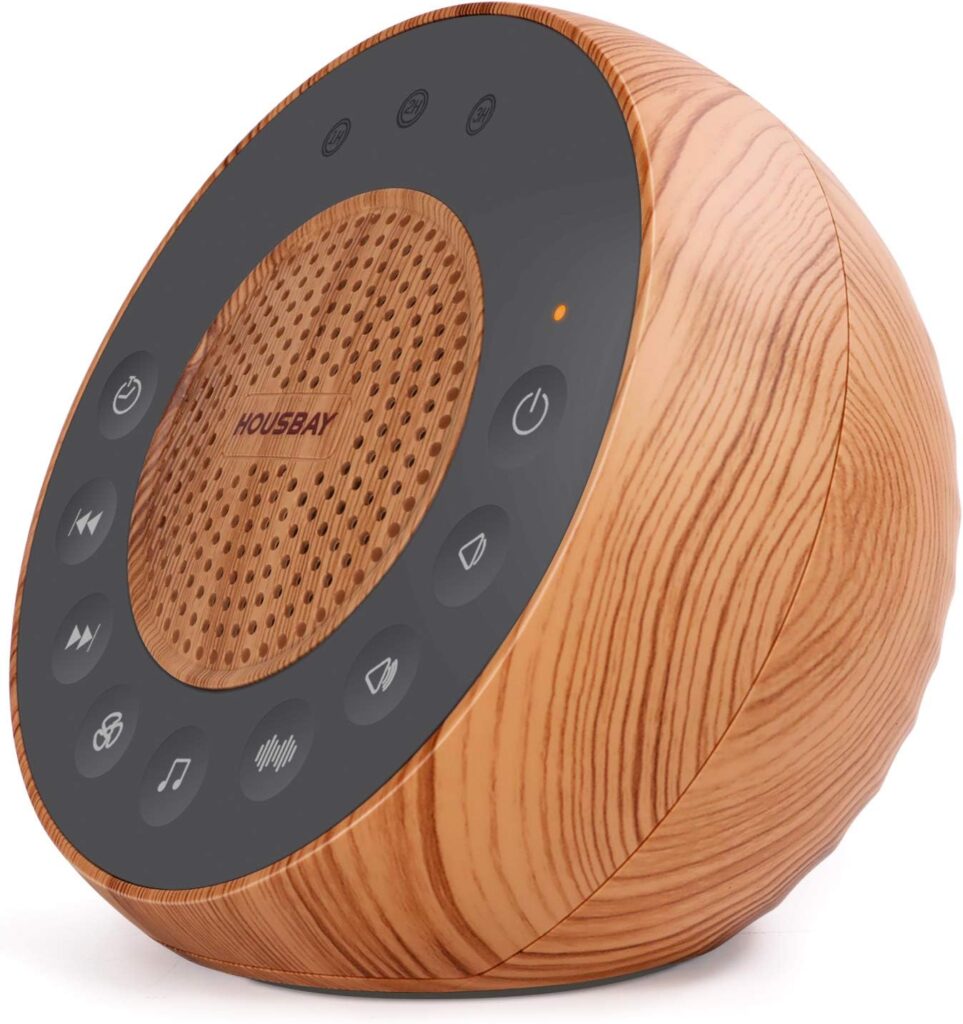Sleep patterns and needs undergo changes as you age, with sleep often a challenge for older adults. Check for natural sleep aids for adults first, before reaching out for that bottle of sleeping pills!
This article explores common natural sleep aids for adults over the counter – substances or techniques that can help promote sleep without the use of prescription medication. 6 White Noise or Sound Machines are featured.
Factors Which Make Sleep Difficult For Older Adults
There are several factors that can make sleep difficult for older adults, including:
Changes in Sleep Patterns: As we age, our internal clocks can shift and lead to changes in sleep patterns, such as difficulty falling asleep or staying asleep.
Medical Conditions: Chronic health conditions such as arthritis, heart disease, and respiratory problems can all contribute to sleep disturbances. In addition chronic pain, breathing problems, gastroesophageal reflux disease and frequent urination are all factors that can lead to less restful sleep.
Medications: Many older adults take multiple medications used in the treatment of age-related disorders, some of which can cause side effects such as insomnia or disrupted sleep.
Mental Health Issues: Anxiety, depression, and other mental health issues are among the main sleep disruptors . They can also impact sleep quality and make it difficult to fall or stay asleep.
Sleep Disorders: Older adults are more likely to develop sleep disorders such as sleep apnea, restless leg syndrome, or insomnia, which can all contribute to difficulty sleeping.
Lifestyle Factors: Factors such as caffeine consumption, alcohol use, or irregular sleep schedules can all impact an older adult’s ability to sleep well. Lack of movement, extra daytime naps, and inconsistent sleep patterns may disturb your night’s rest.
Environmental Factors: Noise, light, changes in temperature, an uncomfortable environment and other environmental factors can also affect an older adult’s ability to fall and stay asleep and can have a negative impact on sleep quality.
How to Address these Factors: Use of Sleep aids for Adults Over the Counter
Now that you understand the factors which make sleep difficult for older adults, it is now easy to look for natural ways to address them with sleep aids for adults over the counter. This can be done through dietary, lifestyle and environmental changes, the use of herbs and supplements, mind body practices, and cognitive behavioral therapy for insomnia.
Dietary Changes
Avoid Heavy Meals Before Bed
Eating a large meal late at night can disrupt sleep. Here are a few reasons why:
Digestion: Digesting a large meal requires energy and can raise your body temperature, which can make it harder for your body to relax and fall asleep. It can also lead to discomfort, bloating, and indigestion which can keep you awake.
Acid reflux: Eating a large meal too close to bedtime can trigger acid reflux, which is when stomach acid flows back up into the esophagus. This can cause heartburn, discomfort, and disrupt your ability to sleep.
Blood sugar levels: Eating a large meal late at night can cause spikes in blood sugar levels, which can lead to fluctuations in insulin production and disrupt your body’s natural sleep cycle.
Overall, it is best to avoid eating large meals late at night to promote better sleep and overall health. It’s recommended to eat at least 2-3 hours before bedtime to allow for proper digestion and to avoid discomfort that can disrupt sleep.
Herbal Seep Aids for Adults
Drinking teas made from herbs like chamomile, valerian, or passionflower can promote relaxation and sleep.
Warm Milk
Drinking milk can have a mild sedative effect and helps sleep because it contains tryptophan
Avoid Stimulants
Some substances can be especially disruptive to sleep, including those taken late at night. To promote better sleep, it is best to avoid or limit the use of caffeine and nicotine.
Caffeine is a stimulating substance, and it can stay in your system for a few hours. It is found in coffee, tea, cocoa and some of the drugs.
Nicotine is a stimulant that can significantly affect sleep. It is best to stop smoking or using nicotine products if you do so – especially if you truly desire to improve your sleep pattern and quality.
Limit Alcohol
Although drinking can help you settle down and even fall asleep in the beginning, it often leads to a disrupted sleep pattern later. Limit or completely limit alcohol consumption, especially close to bedtime.
Lifestyle Changes
To improve sleep, there are several lifestyle changes that can be made. These include exercise, sleep schedule, relaxation techniques, limiting screen time and daytime napping,
Exercise
Regular physical activity during the day can help improve sleep quality and promote better sleep at night. Just be sure to avoid vigorous exercise close to bedtime, as it can be stimulating.
Consistent physical exercise is an important factor in the betterment of sleep quality and amount. Include a moderate exercise routine in your weekly schedule for at least 30 minutes per day such as walking briskly, swimming, or cycling.
Avoid strenuous exercise around bedtime, as it can be energising making it harder to fall asleep.
Going to bed and waking up at the same time every day can help regulate your body’s internal clock and improve the quality of your sleep.
Sleep Schedule
Going to bed and waking up at the same time every day can help regulate your body’s internal clock and improve the quality of your sleep. When your internal clock is being maintained, you will feel sleepy at bedtime as well as wake up feeling refreshed.
Relaxation Techniques
Practices like deep breathing, meditation, and progressive muscle relaxation can help calm the mind and body, making it easier to fall asleep.
Moreover, the creation of a peaceful bedtime ritual may serve as a physiological reminder to the body that it is time for rest and preparation for sleep. This routine should include calming activities that promote relaxation and reduce stress. These include: listening to soothing music, taking a warm bath, reading a book, and practicing gentle stretching or yoga.
Limiting Screen Time
Reducing exposure to screens before bedtime can help improve sleep, as the blue light emitted by devices can interfere with melatonin production.
Limiting Daytime Napping
While short naps (30 minutes or less) can be beneficial for some older adults, napping for too long or too late in the day can interfere with nighttime sleep.
If you nap, try to do so earlier in the day and keep it short. If you find that napping makes it harder to fall asleep at bedtime, try to limit naps or avoid them altogether.
Manage Stress
To achieve better sleep, firstly, try to manage stress levels properly with one or more of these methods:
- Deep breathing exercises
- Meditation or mindfulness practices
- Progressive muscle relaxation
- Taking up a hobby or doing something that you like from time to time.
If the sleep problem is associated with stress or anxiety, which is the case when these problems start to interfere with your sleep significantly, it is time to consult a mental health specialist.
Environmental Changes
The setting of the sleeping space is key to ensure that you get a good night’s rest. Work on the following:
Create a dark environment: Make the bedroom as dark as it can be. If possible use blackout curtains or an eye mask to get the required level of darkness. In the dark, melatonin levels will increase, a hormone that leads to sleep.
Quietness: Minimize noise in the bedroom, using earplugs or a white noise machine if necessary. If you have a partner who snores, consider using a sound machine or sleeping in separate rooms. White noise or sound machines can help mask disruptive noises and create a more restful sleep environment
Regulate Temperature: Keep the bedroom cool, A slightly cool environment is most conducive to sleep.
Create Comfort: Invest in a good mattress and pillows that will give you enough support and relieve the pressure from your body parts.
White Noise and Sound Machines
Both natural aids – white noise machine and sound machines can be very helpful in improving sleep patterns.
A white noise machine produces a single type of sound (white noise) for masking other noises, while a sound machine offers multiple types of sounds, including white noise and various natural or ambient sounds, providing more options for relaxation and sleep.
Herbal Sleep Aids for Adults & Dietary Supplements
Herbal teas: Chamomile, Valerian root, and passionflower teas are known for their calming effects and can help promote relaxation and better sleep.
- Valerian Root: An herbal remedy believed to reduce anxiety and promote relaxation, aiding in sleep.
- Chamomile: Often consumed as a tea, chamomile has calming effects that can help with sleep.
- Passionflower: An herb used to treat anxiety and insomnia, often taken as a tea or supplement.
Melatonin: A hormone that regulates sleep-wake cycles, available in supplement form to help with insomnia and jet lag.
Lavender: Lavender essential oil, used in aromatherapy, can reduce anxiety and improve sleep quality.
Magnesium: A mineral that can help relax muscles and improve sleep quality.
Mind-Body Practices
- Yoga: Gentle yoga or stretching before bed can help relax the body and mind.
- Tai Chi: A form of martial arts known for its slow, deliberate movements and meditative nature, which can help improve sleep.
- Acupuncture: Some people find that acupuncture helps with sleep problems.
Cognitive Behavioral Therapy for Insomnia (CBT-I)
CBT-I is a structured program that helps address the thoughts and behaviors that prevent restful sleep. This is often considered one of the most effective treatments for chronic insomnia.
Note that individual responses to these natural sleep aids may vary, so it may take some trial and error to find the best option for you. Consulting with a healthcare provider before trying any new sleep aid is recommended if you have any underlying health conditions or are taking medications.
Conclusion – Natural Sleep Aids for Adults
Knowing what prevents better rest and adopting strategies that result in improved sleep quality are steps that can be taken to enhance the well-being of the elderly.
If sleep problems persist, you can seek help from a professional as this will be helpful to you in finding solutions that are personalized for you and nights of restful sleep are on the horizon. Prioritizing sleep is a key component of healthy aging that assists seniors in maintaining their physical health, mental capacities, and general well-being during the years that they have ahead of them.
Know of any novel natural sleep techniques or aids? Leave a comment below
Related Articles
- How to Treat Arthritis and Sleep Problems – The Connection
- Why Do Older People Sleep so Much – Repair and Rejuvenate
- 10 Foods that Promote Better Sleep – Tips
- How to Boost the Immune System Quickly – Role of Diet and Sleep
- 7 Top Mattresses for Back Pain – Blissful Sleep
- 7 Sure Sleep Tips for Older Adults that Work
FAQ
What are some common sleep aids for adults over the counter ?
Common over-the-counter sleep aids include diphenhydramine (Benadryl), doxylamine (Unisom), melatonin, and valerian root supplements. These can help promote sleep but should be used with caution.
Are natural sleep aids for adults over the counter safe for long-term use?
While natural sleep aids for adults over the counter are generally safe for short-term use, it’s always best to consult with a healthcare provider before using them long-term. Some natural supplements can interact with medications or have potential side effects if used regularly.
How can I improve my sleep without relying on medication?
In addition to using natural sleep aids, practicing good sleep techniques can also improve your sleep quality. This includes creating a bedtime routine, avoiding screens before bed, maintaining a consistent sleep schedule, and creating a comfortable sleep environment.
What are popular herbal sleep aids for adults?
Popular herbal sleep aids for adults include valerian root, chamomile, lavender, passionflower, and lemon balm. These herbs are commonly used in teas or supplements to promote relaxation and improve sleep quality.
Are natural sleep aids for adults safe to use regularly?
Generally, natural sleep aids are safe for short-term use, but long-term safety varies. It’s important to consult a healthcare provider, especially if you have underlying health conditions or take other medications.
What are effective sleep aids for adults?
Effective sleep aids for adults include over-the-counter options like melatonin and antihistamines (e.g., diphenhydramine), prescription medications, and herbal remedies like valerian root and chamomile.







